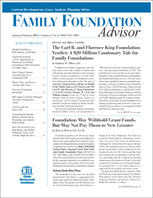“Give It Back”—Legal and Practical Considerations When a Charitable Contribution Must Be Returned
Author: Bradley Fletcher.; Jennifer Justice.
Source: Volume 13, Number 05, July/August 2014 , pp.1-7(7)

next article > |return to table of contents
Abstract:
There are some situations in which a charitable organization may return a contribution—for example, where, despite appearances, no charitable gift was legally made because the donor lacked capacity or was subject to undue influence; or where, due to the absence or occurrence of a certain condition, the charitable organization is divested of title in the gifted property. However, a charitable organization can face a variety of negative consequences if it returns a contribution. For charitable organizations that are tax-exempt and described under IRC §501(c)(3), the risks of the return of a donation include revocation of tax-exempt status (due to inurement or nonincidental private benefit) and imposition of excise taxes (for self-dealing, an excess benefit transaction under the Intermediate Sanctions, or a taxable expenditure). This article outlines the risks of a charitable organization’s returning a contribution and explains the specific circumstances in which a return may be permitted.Keywords: IRC IRC §4941, §4945 excise taxes; Revocation of Exemption for Private Inurement; PLR 201321034
Affiliations:
1: Strasburger & Price, LLP; 2: Southern Methodist University School of Law.